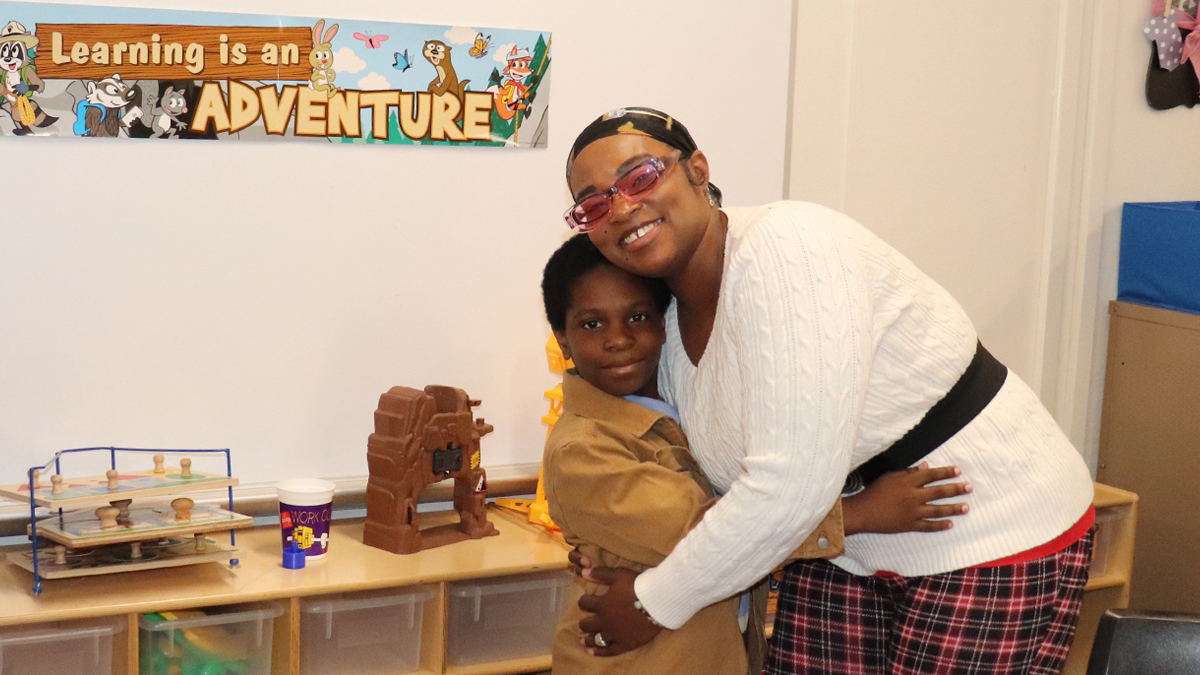
Pinewood Elementary is more than just a school to Maxton Clark.
Now 10 years old, he’s been going to the northwest Omaha elementary school since he was just an 8-month-old baby receiving early childhood services alongside his older siblings.
He took his first steps inside the Panther Den, the family room named for the school’s mascot. He attended preschool there and is now a fourth grader with big aspirations to graduate from Harvard University, become a scientist, and invent the first time machine.
“Max wanted to be in school,” said his mother, Erin Clark. “He told someone, ‘I live at Pinewood.’ He grew up thinking it was his home.”
Pinewood has been a central part of the Clark family’s life since oldest sister Makiela, now a high school freshman, started Kindergarten there. Middle brother Marcus, Jr. (MJ) was enrolled in the home visiting and PreKindergarten programs, and Maxton, never one to be left out, followed suit. Erin Clark was at the school so often, some of the students thought she worked there.
Making early connections with families, providing high-quality early education services, and ensuring educational continuity—this is what the School as Hub approach under the Superintendents’ Early Childhood Plan is all about.
“Kids love coming here at 1, 2, 3 years old,” said Mary Ellyn Dunn, the family facilitator at Pinewood. “They see this as their school. They see this as their classroom.”
The Superintendents’ Plan is a collaborative effort of the 11 school districts in metro Omaha that make up the Learning Community of Douglas and Sarpy Counties to develop early childhood programs, especially for children living in poverty. The Buffett Early Childhood Institute at the University of Nebraska provides leadership and support for the plan.
At the core of the School as Hub approach is the idea that schools can serve as a “hub” to connect children and their families to resources within and beyond school walls. Ten schools, including Pinewood, participate, impacting more than 2,800 children in PreK to Grade 3.
The Omaha Public Schools, of which Pinewood is a part, is actually expanding the School as Hub approach to six additional schools.
“Everybody knows where the school is in the community, and our school belongs to our community,” said Pinewood Principal Kristi Reinsch.
“We found out in COVID we had families needing to access resources that maybe they hadn't had to access before, for food pantries or financial assistance, and they weren't quite sure where to go for that, but they knew where the school was,” she said.
Clark was new to Nebraska when her children were young. As a School as Hub school, Pinewood served as a vital community connection point.
MJ and Max received home visiting services, allowing Pinewood staff to observe their developmental milestones and pass on brain-building tips to Clark and her husband. Drop-in events with other families and young children helped them learn to play with others. They attended Pinewood family movie nights, game nights, and school concerts.
“I taught them at home, but they needed that social aspect,” Clark said.
Her kids grew comfortable at the school, and Max begged to visit the Panther Den even on off-days. He became the family room’s ambassador, making new kids feel welcome.
“It started a long love of learning,” Clark said. “The Panther Den, I think it’s helped Max identify who he is, beyond just ‘the sibling.’”
When Clark needed a little extra help, Dunn and former home visitor Tierra Stennis helped the family qualify for free and reduced lunch and research assistance for new homeowners. Clark felt confident talking to teachers and advocating for her kids.
“Sometimes families haven't had the most positive experiences when they were in school,” Reinsch said. “They may be nervous about it. So, if we can provide that positive experience, and they know who the people are in the school, it's not as threatening. They can be an active partner in their child's learning.”
Amy Schmidtke, the Buffett Institute’s director of educational practice, said the Clark family’s story illustrates the broader impact of the School as Hub approach: when schools engage with families from the very beginning, they create strong foundations for child development, academic success, and lifelong learning.
Home visitors can answer questions about why a baby isn’t talking yet or make a referral for early intervention services if they suspect developmental delays.
At socialization events, parents socialize with each other and swap tips about potty training or teething. They learn strategies to support their children's learning and can receive information from the school on the transition to preschool or Kindergarten.
School became a familiar, joyful place for Maxton long before he entered PreK—positive associations with school can reduce children’s anxiety and increase engagement.
“Just like it did for Maxton, the School as Hub approach is designed to create those relationships early and sustain them over time, so that families feel confident, children feel a strong sense of belonging, and learning is truly continuous from birth through third grade,” Schmidtke said.
Maxton, a voracious reader who plays the viola and sings in the school choir, always wanted to go to school because his older siblings made it sound fun.
“It made me really nice, really smart, and the teachers taught me a lot,” he said.
He has big ambitions and a plan to achieve them. First, Nathan Hale Middle School and Northwest High. Then, Harvard, renowned for its science programs.
Maybe he’ll create groundbreaking medical treatments. Maybe he’ll build that time machine. Maybe he’ll remember getting a strong start inside the Panther Den.
Erin Duffy is the managing editor at the Buffett Early Childhood Institute at the University of Nebraska and writes about early childhood issues that affect children, families, educators, and communities. Previously, she spent more than a decade covering education stories and more for daily newspapers.

